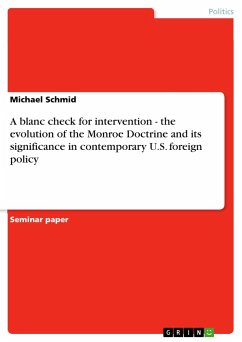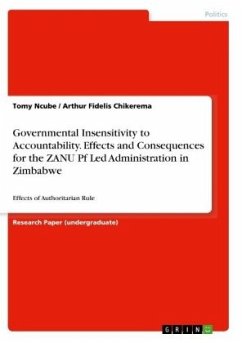
The Bush Doctrine of Preemptive Strike. Significance and Consequences

PAYBACK Punkte
0 °P sammeln!
Seminar paper from the year 2005 in the subject Politics - Region: USA, grade: 2,3, Free University of Berlin, language: English, abstract: With the release of the National Security Strategy (NSS) in September 2002, theadministration of President George W. Bush developed the ideological keystone for U.S.foreign policy for the beginning of the 21st century. The document is therefore often referredto as the Bush Doctrine. Its publication, and more so, its application in the American foreignpolicy agenda, has caused tensions among politicians, diplomats and citizens all around theglobe. The conse...
Seminar paper from the year 2005 in the subject Politics - Region: USA, grade: 2,3, Free University of Berlin, language: English, abstract: With the release of the National Security Strategy (NSS) in September 2002, theadministration of President George W. Bush developed the ideological keystone for U.S.foreign policy for the beginning of the 21st century. The document is therefore often referredto as the Bush Doctrine. Its publication, and more so, its application in the American foreignpolicy agenda, has caused tensions among politicians, diplomats and citizens all around theglobe. The consequences, however, may be more consequential than just a temporary low inthe international political climate. The Bush Doctrine "[...] affirms the legitimacy of anAmerican preventive strike and emphasizes the notion that 'If you are not with us, you areagainst us.' U.S. foreign policy, therefore, is [...] about shedding the multilateralism favoredby the Clinton administration and pursuing a more active, unilateral approach" (Glazov2002, 1).In the following, I intend to analyze what consequences the U.S. foreign policyissued in the 2002 NSS has on America itself and on the international community in generalIn particular, I will deal with the definition of prevention and preemption and theAdministration's unilateral approach towards global politics. As both friends and enemiesevaluate the meaning of the 2002 NSS, it becomes evident that great danger might lie in theambiguous wording of the Doctrine. The question is now, whether it will prove to be a soundand effective strategy in the War on Terror or continue to disunite America and its allies, ifits content is not properly clarified and addressed













